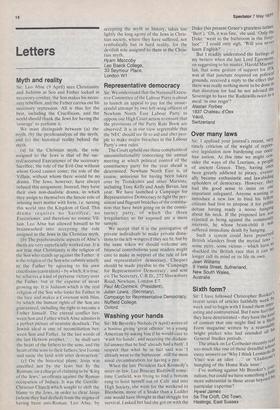Myth and reality
Sir: Leo Abse (9 April) sees Christianity and Judaism as Son and Father locked in necessary combat; the Son makes his necessary rebellion, and the Father carries out his necessary repression. All is thus for the best, including the Crucifixion, and the world should thank the Jews for having the 'courage' to perform it.
We must distinguish between (a) the myth, (b) the psychoanalysis of the myth, and (c) the historical reality behind the myth.
(a) In the Christian myth, the role assigned to the Jews is that of the sacred/accursed Executioner of the necessary Sacrifice; the role of the Evil One without whom Good cannot come; the role of the Villain, without whom there would be no drama. The Jews, however, have always refused this assignment. Instead, they have their own non-dualistic drama, in which they assign to themselves the heroic role of infusing inert matter with form, i.e. turning this world into the Kingdom of God. This drama requires no Sacrifice, no Executioner, and therefore no cosmic Villain. Leo Abse has allowed himself to be brainwashed into accepting the role assigned to the Jews in the Christian myth.
(b) The psychoanalytic aspects of Abse's thesis are very superficially worked out. It is not true that Christianity is the religion of the Son who stands up against the Father: it is the religion of the Son who submits utterly to the Father by agreeing to his own crucifixion (castration) — by which, it is true, he achieves a kind of perverse victory over the Father, but at the expense of never growing up. It is Judaism which is the real religion of the Son who looks his Father in the face and makes a Covenant with Him, by which the human rights of the Son are guaranteed, including the right to become a Father himself. The eternal conflict between Son and Father which Abse admires is a perfect picture of neurotic deadlock. The Jewish ideal is one of reconciliation between Son and Father. In the last words of the last Hebrew prophet, he shall turn the heart of the fathers to the sons, and the heart of the sons to their fathers; lest I come and smite the land with utter destruction.'
(c) On the historical plane, Jesus was crucified, not by the Jews but by the Romans, on a charge of claiming to be 'King of the Jews,' an offence against the Roman occupation of Judaea. It was the GentileChristian Church which sought to shift the blame to the Jews, in order to clear Jesus (whom they had deified) from the stigma of having been anti-Roman. Leo Abse, by, accepting the myth as history, takes too lightly the long agony of the Jews in Christian society, where they have suffered, not symbolically but in hard reality, for the devilish role assigned to them in the Christian myth.
Hyam Maccoby
Leo Baeck College,
33 Seymour Place, London W1






































 Previous page
Previous page